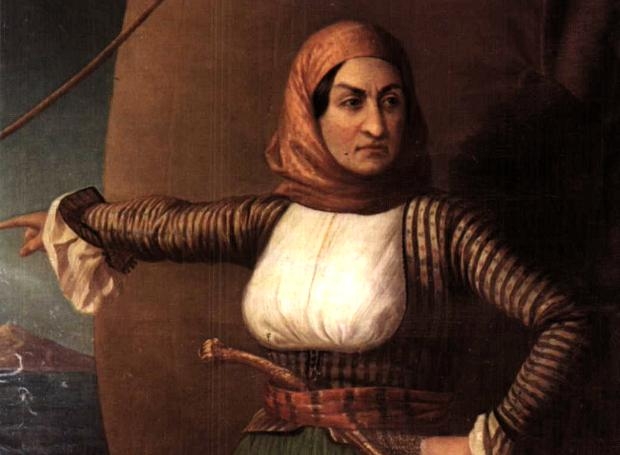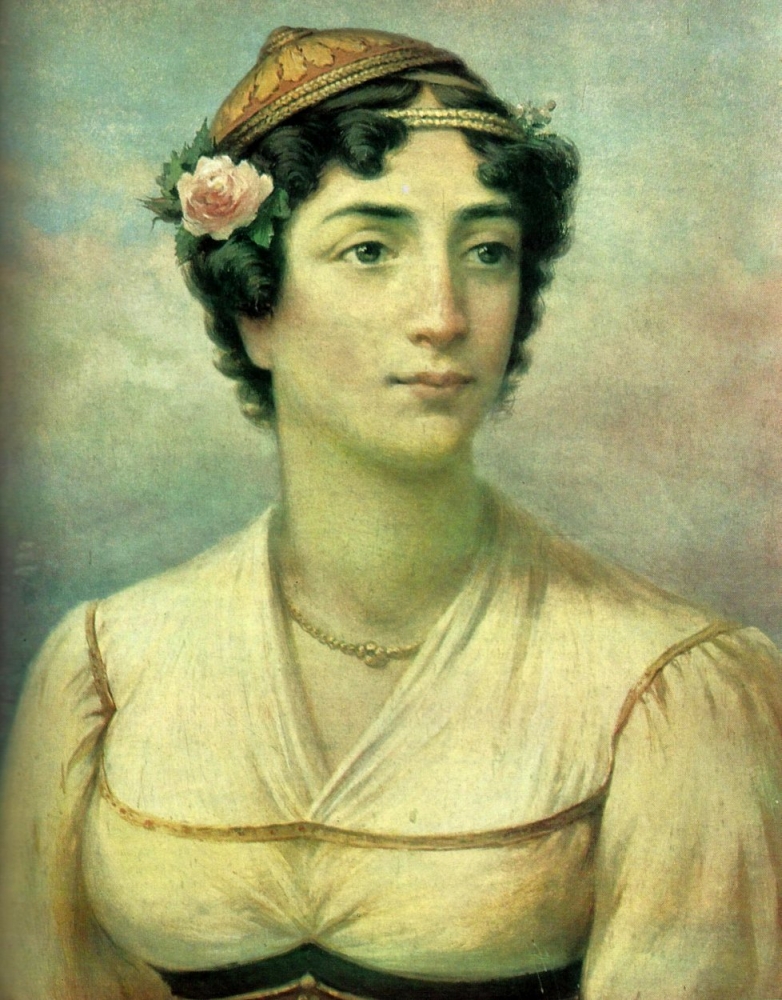
The anniversary of the celebration of March 25 was established on March 15, 1838 by King Otto, in order to be associated with the ecclesiastical event of the Annunciation. It was also the wish of Alexandros Ypsilantis and the Filiki Eteria or Society of Friends, to connect the beginning of the revolution with a great ecclesiastical celebration to stimulate the minds of the enslaved Greeks.
Actually, the Revolution did not begin on March 25, 1821, but a few days earlier in the Peloponnese, an area with a solid Greek population and a small Turkish military presence.
Of course we all know the most important heroes of 1821, among them two women who played a key role in our history.
• Laskarina Bouboulina

She was the daughter of Hydra captain Stavrianos Pinotsis and was born in 1771 in the prisons of Constantinople, where her father was detained for participating in the Orlofika. At the age of 17 she married Captain Dimitrios Giannouzas of Spetses and at the age of 26 she became a widow with three children. In 1801 she married in a second marriage the ship owner Dimitrios Bouboulis from Spetses and since then she became known as Bouboulina (Bouboulis' wife). She also lost her second husband with whom she had three children. She invested the property of her deceased husband, which exceeded 300,000 thalers, acquiring shares in various Spetses ships. In Istanbul he seems to have been initiated into the Friendly Society in 1819, but this is disputed, as it is known that the organization never made women members. As soon as Bouboulina returned to Spetses, she ordered the construction of the ship "Agamemnon", for which she spent 25,000 dichotomies. With a length of 48 bar (about 34 meters) and equipped with 18 cannons, the "Agamemnon" was launched in 1820 and was the largest ship that took part in the Revolution. The descendants of Bouboulina donated the ship "Agamemnon" to the newly formed state, which became the flagship of the Greek Fleet named "Spetsai". It was blown up by Andreas Miaoulis in Poros during the political riots of July 29, 1831. The mansion of Bouboulina in Spetses is now a Museum. It includes a collection of weapons, letters and other archives, old books, portraits of Bouboulina, her personal belongings, furniture and distinctions awarded mainly by foreign governments.
After her death she received the title of Admiral from Russia, an unprecedented honor for a woman. In 2018, it was her homeland's turn to honor her. By decision of the Ministry of National Defense (Government Gazette 373, Issue C, of April 11), she was awarded the rank of Vice Admiral, the First Class War Cross and the Medal of Excellence, for "her unparalleled heroism, self-sacrifice and devotion she showed to the Greek Nation, which made it in the memory of all Greeks as a National ideal ", according to the reasoning of the decision. Prominent figure of the Greek Revolution, one of the few women who distinguished themselves in the Struggle.
In 1959 a film was made based on the life of the heroine. Her title was Bouboulina and the eponymous heroine was played by Irene Pappas.
• Manto Mavrogenous

Information about her life and work is drawn mainly from foreign writers, whom she seems to have seduced with her personality and beauty and not from her contemporary Greek historians and memoirists, who silenced or underestimated her contribution to the Struggle. According to the French philhellene military and writer Maxim Rebo, Manto knew French and Italian. She was endowed with a sweet character, but "when she talks about the freedom of her homeland, she is inflamed, the conversation comes alive and her words flow with a natural eloquence that holds your breath." With the beginning of the Revolution, Manto Mavrogenous from Tinos, where she lived after the death of her father, rushed to Mykonos and led the uprising of the inhabitants of the island. In May 1825, Manto offered the government bonds of 30,000 groschen and asked for them to be allocated to take part in operations against the Turkish-Egyptians, with all the soldiers it would have at its disposal. Manto appealed to the women of Paris and the Enlightenment in Europe to take the side of the Greeks. The financial support of the Struggle by Manto Mavrogenous and her action in general, such as her letters to the philhellenes of France and England, made her name legendary in European philhellenic circles and her portrait was printed and circulated in 1827 throughout Europe.
When the war is over, for her overall activity, Ioannis Kapodistrias awarded her - the only honor to a woman - the position of Lieutenant General and granted her a residence in Nafplio, where she moved. She was in possession of a relic sword with the inscription "Judge the Lord, wronging me, fighting me, reign of the Kings". This sword is said to date back to the time of Constantine the Great and that Mavrogenous gave it to Kapodistrias. Mavrogenous died of typhoid fever in Paros in July 1848, alone, forgotten and destitute, having spent all her fortune on the struggle for freedom.
The revolution of 1821 was not only about the liberation from the Turks, it was also about something equally important, the general liberation and freedom of our people as Greeks. It plays a decisive role in our history and today, 200 years later, the importance of celebrating this day suddenly seems more necessary than ever…